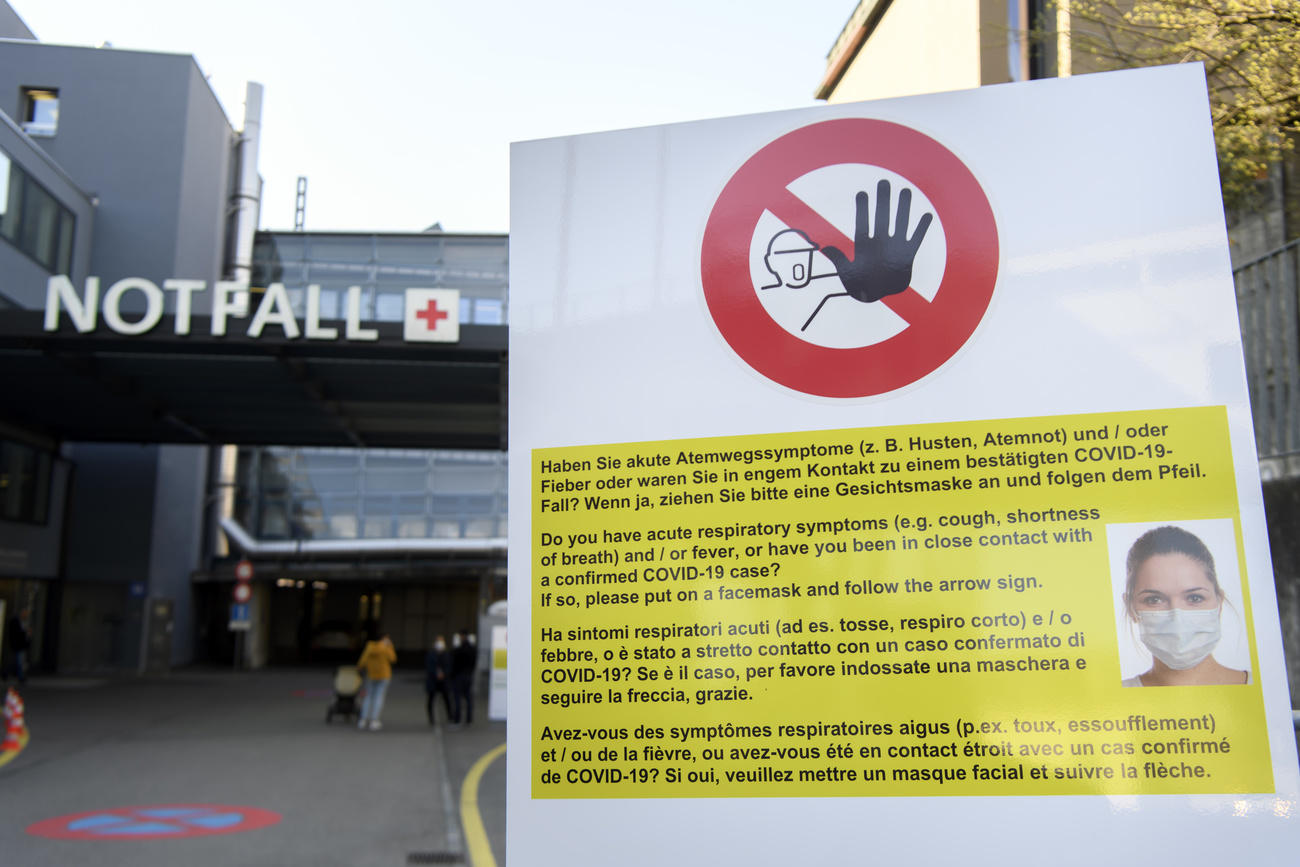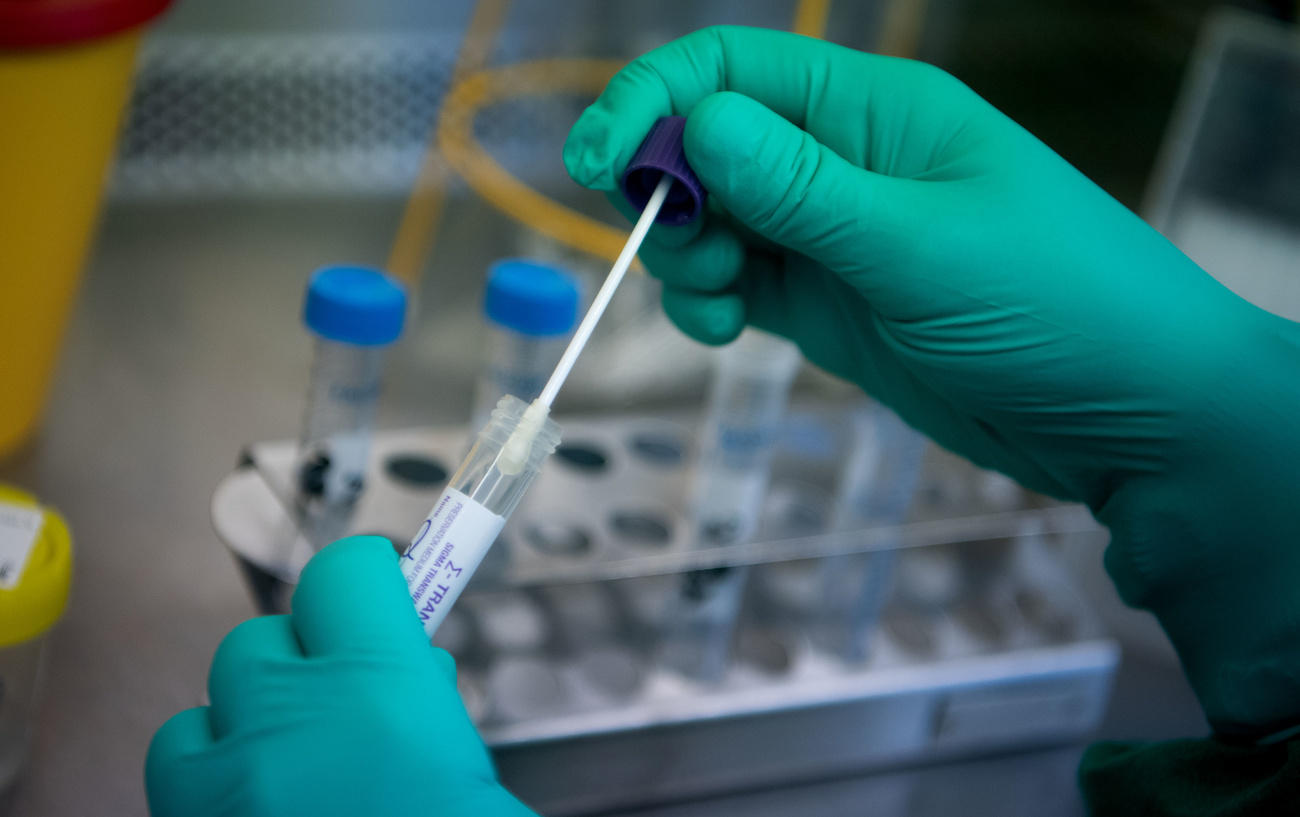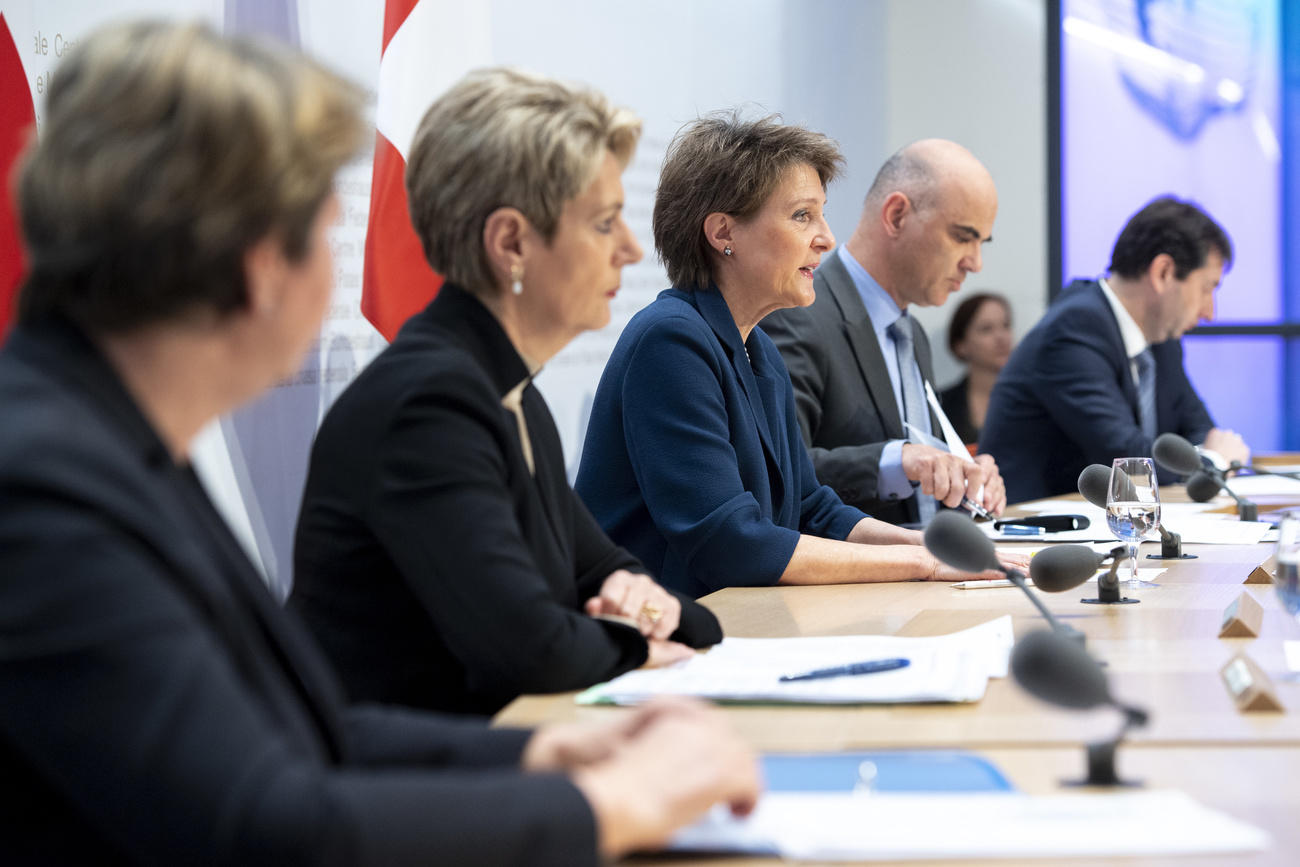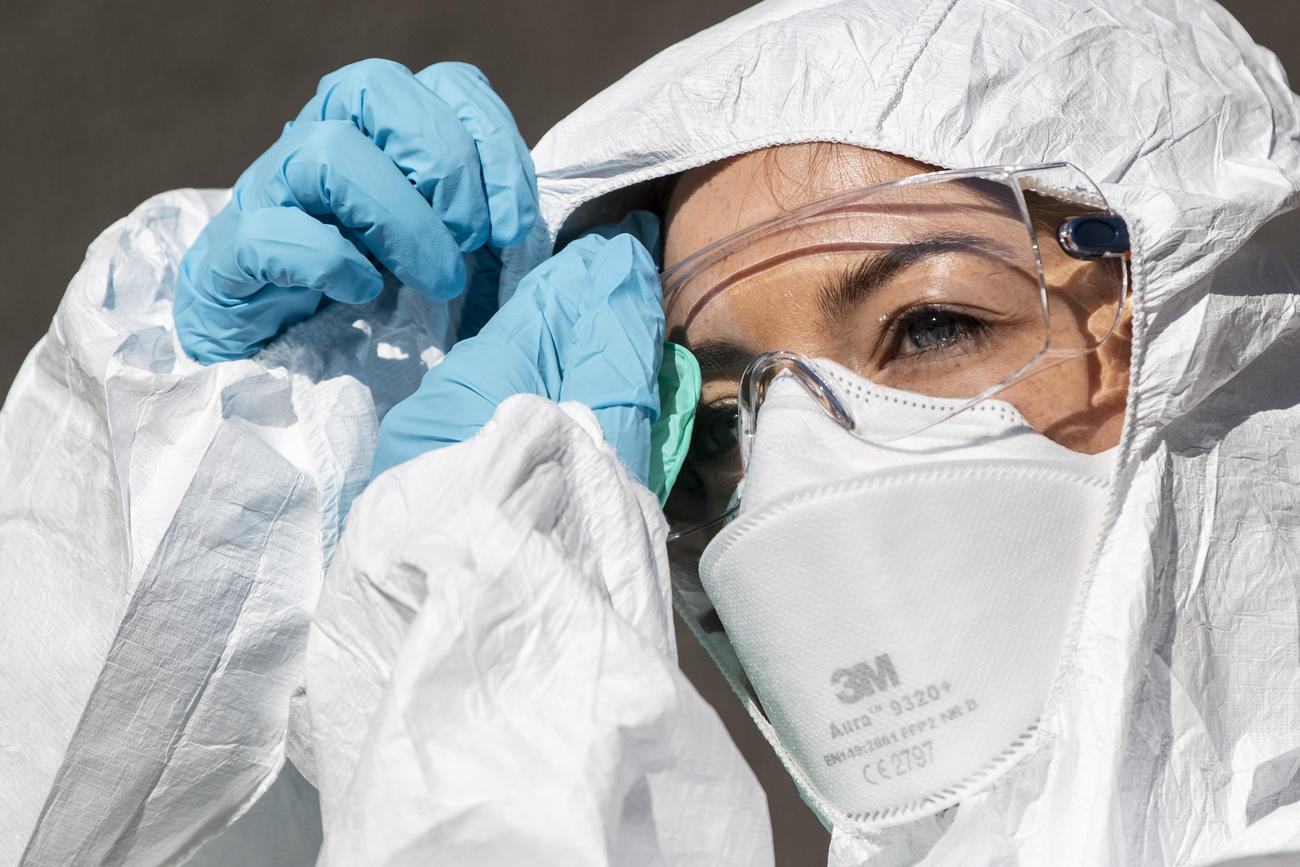Rapid spread of coronavirus complicates systematic testing

The Swiss government has been taking heat for its targeted approach to coronavirus testing, arguing that the country has passed the point of catching every case. However, some cantons are rapidly building up back-end capacity to massively scale up testing.
On Monday, the World Health Organization (WHO) called on countries to ramp up testingExternal link as the best way to curb the coronavirus pandemic. “We have a simple message to all countries – test, test, test,” WHO Director General Tedros Adhanom Ghebreyesu told a news conference in Geneva.
However, the Swiss government has not made testing the top priority in its strategy to contain the virus. Daniel Koch, head of the division of communicable diseases at the Federal Office of Public Health (FOPH) said on Tuesday that widespread testing makes sense for countries at the beginning of an epidemic, in order to prevent a broad spread.
“That phase is over in Europe, so this [WHO] strategy is not specifically for Europe or Switzerland,” said Koch.
He added that it isn’t possible in Switzerland and other countries in a similar situation to test every person who has a head cold.
When the cases first started appearing in Switzerland on February 25, Switzerland had a systematic approach of testing those traveling from infected areas and those in contact with anyone who was infected.
Once the virus started spreading within the country, the government decidedExternal link in early March to target testing for high-risk groups (chronic illnesses or elderly) and those which have serious symptoms.
During a press conference on Monday, Health Minister Alain Berset defended the strategy: “We do not have access to 8.5 million tests, so we must act in a targeted manner.”
A key part of the rationale was to not overload hospitals and rather reserve healthcare resources for those who are in the greatest danger if infected. For all others, they should stay home and follow the hygiene guidelines.

More
Coronavirus: the situation in Switzerland
The government says that it is testing around 2,500 people per day in contrast to around 20,000 testsExternal link performed per day in South Korea. Koch said that the government plans to increase capabilities and extend testing to a larger subset of the population but has given few details.
Back-end build up
Behind the scenes, cantons are building up testing infrastructure. On Monday, canton Bern announced that it will open a testing facility with a drive-thru optionExternal link. It is expected to carry out 800-1,000 tests per day with the help of Swiss pharmaceutical company Roche’s recently approved test system.
Gundekar Giebel, who heads communications for the Bern cantonal health office confirmed to swissinfo.ch that the centre will be up and running next week with almost full certainty at the BernExpo exhibition hall and that another two centres are planned in Biel and Thun. People will be able to receive results within 24 hours.
“This will increase the testing capacity possibly 5 or more times the current amount,” says Giebel.
It is difficult to estimate the total number of cases that have been tested thus far and how many per day but Giebel says Bern’s largest hospital, the Inselspital, has performed around 1,500 tests in the last three weeks.
With the new centres, he estimates that 2,500-3,000 tests will be possible per day in the canton. Currently, there are 15-16 locations that can take nose or throat samples. This includes hospitals, a couple of doctors offices as well as a few villages with private medical centres that have set up containers.
“We need to get people out of emergency rooms and out of doctor’s offices because they block the capacity for real emergency corona treatment for people,” says Giebel.
As of 9:20 this morning there were 193 positive cases in Bern but things are moving so quickly he imagines that the number will end up much higher by the end of the day.
On the Thursday following publication of this article, the Bern cantonal authorities said that the planned drive-thru centre will not open next week as planned because the test materials still need to be procured.
Basel country has also set up two mobile teams to test people with symptoms at their homes. At present, the primary care doctor must be contacted and request testing from the mobile team. From Wednesday, doctors in Basel can also send their patients to one of two stationsExternal link the cantonal crisis team has set up in sports centres or halls.
The university hospital in Canton Vaud (CHUV) has developed a toolExternal link to help the public and health professionals assess the risk of infection and determine appropriate next steps.
As of March 11, all accredited microbiology laboratories in the canton of Zurich have been able to conduct an initial diagnosis for SARS-CoV-2.
If someone tests positive in the cantonal tests, results are sent to the National Reference Center for Emerging Viral Diseases (CRIVE) for confirmation.
Uneasy feeling
Even with the increasing capacity, questions remain about who should be tested. Giebel says that they are still in discussions about the protocol including whether people should call their primary doctor first and whether testing will be extended to more people.
This has been the subject of debate and some unease among the population. Jamil Chade, a Brasilian journalist in Geneva, came down with a high fever, chills and a cough last Thursday. He had been traveling all over the city reporting and was worried that he might have been infected.
He went to a private clinic in Geneva on Friday and asked to be tested. However, the doctor said that he didn’t meet the criteria for testing. She added that it wouldn’t make a difference anyway as the recommendations would be the same if he was positive or negative.
“She told me to stay at home and gave me paracetamol, and said that if I had tested positive, I would have given you the same instructions.”
Chade followed the doctor’s orders but believes that testing positive does make people behave differently. “If I knew I was infected, I would tell others I’ve been in contact with so they could take precautions,” he said.
Fighting blindfolded
Criticism of Switzerland’s targeted rather than widespread approach has been mounting with a minister from SingaporeExternal link, which has been praised for its effective containment measures, singling out Switzerland and the United Kingdom for “abandoning any measure to contain or restrain the virus.”
Some virology experts inside the country have also been calling for testing to be scaled up.
One of the challenges with the strategy is the confusion it creates in understanding the numbers. It is difficult to understand the scale of the problem and put the mortality rate in perspective if it is not clear how many cases actually exist.
“All countries should be able to test all suspected cases, they cannot fight this pandemic blindfolded,” WHO Director General Ghebreyesu said on Monday. Without testing, cases cannot be isolated and the chain of infection will not be broken, he added.
The Financial TimesExternal link reported on Tuesday that testing and retesting in the small Italian community of Vò, near Venice had stopped all new infections in the town that was at the centre of the country’s outbreak.
The Swiss government has been treading lightly to maintain public trust and not raise too many expectations. “It’s not that we are hiding anything from the figures or that we don’t want to share them,” explained Koch at Tuesday’s press conference. “It’s just that, it is so fast and so big that we’re really struggling to present these figures to you now in the form the press would like.”
The pure numbers are no longer so important, said Koch. What is important is to have enough beds ready for sick people when the wave comes.

More
Roche working ‘around the clock’ to provide coronavirus test

In compliance with the JTI standards
More: SWI swissinfo.ch certified by the Journalism Trust Initiative












You can find an overview of ongoing debates with our journalists here . Please join us!
If you want to start a conversation about a topic raised in this article or want to report factual errors, email us at english@swissinfo.ch.